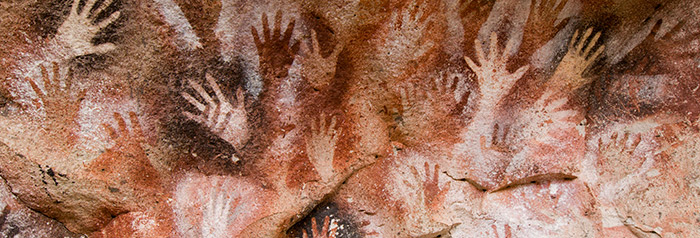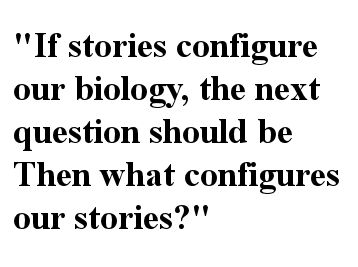
Storytelling is an ancient custom, existing long before recorded history. While the mediums and methods have changed, stories continue to fascinate mankind. It’s a thread that traces as far back as the dawn of human history. Perhaps even more interesting are the thematic elements that humans consistently return to. Mythicist Joseph Campbell gathered these threads into a template, a thematic pattern that reoccurs, independently, in nearly every culture. He describes it as The Hero’s Journey, a journey of redemption which draws one individual into a supernatural quest, transformation, and returns them to their world empowered.
But where did this impulse and the corresponding need for stories and myths, come from? And why would universal stories all contain similar thematic elements?
Some attempt to answer the historical prevalence of, and attraction to, stories through purely biological processes. In other words, storytelling and our need for it is nothing more than an evolutionary mechanism. In their article, How Stories Configure Human Nature, the science site Big Think explores the phenomenon from just that angle. Here’s the first four points in their argument:
1. It is in our nature to need stories. We arrive “biologically prepared” for them. They were evolutionarily crucial. We feel and think in story-logic (story-causality configures our reaction-biology).
2. Like our language instinct, a story drive—inborn hunger to hear and make stories—emerges untutored (=“biologically prepared”).
3. “Every culture bathes its children in stories” (to explain how the world works, to educate their emotions).
4. Story patterns are like another layer of grammar—language patterning the character types, plots, and norms important in our culture.
While it’s impossible to deny that stories are used to reinforce norms important to culture, the bigger questions are a.) Where did these “norms” arise (inside or outside us) and b.) Why the heck did they infuse our DNA in the first place (what compelling need required stories for survival)? So we arrive “biologically prepared” with an “inborn hunger to hear and make stories,” a hunger that “emerges untutored.” But how are stories “evolutionarily crucial”? Of course, one could see how the Story of the Wayward Boy could serve as warning to the youth of the tribe about the dangers of disobeying one’s elders. However, if man is evolved pond scum, it’s worth asking how parables and fables came to matter to those aquatic, multi-limbed ancestors. I mean, what use is a limerick to a creature a million mutations away from walking upright? You could maybe grant something like a wing might possibly sprout if a lizard jumped from a tree for a hundred thousand generations. (Where the impulse came to jump from trees is another story.) But how does storytelling — both the need for transmission of stories and a willing reception of stories — actually evolve in a species? What compelling gap caused stories and storytelling to become necessary for the survival of fittest? The absence of ethics? If so, then stories are little more than a rock or a spear — a tool to accomplish some bigger purpose, to configure our biology. However, if stories configure our biology, the next question should be Then what configures our stories?
 While “Story patterns transmit, often tacitly, social rules and norms,” is it not odd that humans are “biologically prepared” with an “inborn hunger” to require those “norms”? For the secularist, these social norms are little more than useful moral codes, entirely subjective, rooted in pragmatics and survival. In other words, a particular culture’s appeal to ethics or morality is simply an appeal to its own utilitarian laws. It is unrelated to a Transcendant Law in the least. For in a materialistic universe, Transcendant Laws have no place.
While “Story patterns transmit, often tacitly, social rules and norms,” is it not odd that humans are “biologically prepared” with an “inborn hunger” to require those “norms”? For the secularist, these social norms are little more than useful moral codes, entirely subjective, rooted in pragmatics and survival. In other words, a particular culture’s appeal to ethics or morality is simply an appeal to its own utilitarian laws. It is unrelated to a Transcendant Law in the least. For in a materialistic universe, Transcendant Laws have no place.
But if The Hero’s Journey rightly identifies thematic elements that cut across multiple cultures — cultures seperated by geography and genetics — could it not speak to something Transcendant?
And here’s where secular and religious worldviews diverge regarding the essence of story. In Scripture, story is not simply a mechanism for social/moral inculcation. Indeed, it is that. The Jews were commanded to tell and retell the history of their lineage, the heroes (and rascals) of the faith, and the Laws of the Tribe. However, the Jewish story was part of a much bigger story. Some have described it as the Story of God. But whatever you call it, it is an epic tale that can be broken into three specific movements. Many of those movements (much like The Hero’s Journey) can be found in contemporary tales. Those movements look something like this:
- Creation. Fall. Redemption.
- Creation. Desecration. Recreation.
- Generation. Degeneration. Regeneration.
- Home. Homelessness. Homecoming.
- Eden. The Wilderness. The Promised Land.
- The Shire. Mordor. The Shire / Grey Havens.
Notice that the story of the Jews was just part of a much bigger story, a story about the redemption of humanity; it, like all of our lives, involves a macro-narrative (meta-narrative?) and a micro-narrative. It is a larger story made up of countless smaller stories. Or… an individual tale joined to something Grand. In fact, the very essence of the Gospel is not just the re-telling of a Story — that Christ came, died for our sins, and rose again for our justification — but it is also an invitation to become part of that Story. The evangel is one who not only shares the Story, but invites others into the Story.
And this is the huge divide between story as an evolutionary mechanism and story as a vehicle to the Transcendent.
Our individual stories, and the individual stories in any culture, take place within a much bigger story. It is a story about the history of the Universe, the Fall of Man, his Redemption, and the Culmination of human history. It’s a story that speaks to something above and outside us, a Call to Adventure, a moral battle, a transformation, and a return to the tribe with… gifts, insight, and power (The Hero’s Journey). It is a story with clear moral boundaries and consequences. It’s a story with high stakes. Not only does Scripture teach that God impregnates every human being with an awareness of the Story, placing His Law within our hearts and minds, but that God strives with us, forever wooing us to join our micro-narrative to His epic.
This is what separates men from animals. As Chesterton put it, “the more we really look at man as an animal, the less he will look like one.” We are “biologically prepared” for stories, not because they serve us like an eye or a pancreas does, but because they speak to something Transcendent. This is what makes us human. Our story is part of a much bigger Story. We look up at the stars and in it we find Something, no–Someone, looking back at us. Drawing us to Himself. And we hunger to join that narrative.














The soul has always been a problem for the materialist. How to explain all these mysterious things, like art and beauty and music? They have no evolutionary place.
I’ve been listening to Michael Heiser’s Unseen Realms lectures on YouTube (all about the Jewish perspective on the Bible’s spirit world). The deeper I go, the more I realize how dangerous materialism is. By looking only at what is seen, we ignore the larger reality of what is truly happening in the world.
I think that’s why materialists believe in aliens and fairies. They crave the supernatural even as they reject it. So they are prey for the wicked angels.
Here’s one way stories could have evolved along with humans:
1 – As the pre-human organism became more complex, its emerging higher faculties needed to seek out more purpose than just the biological (eat, sleep, piss, procreate, die)
2 – Stories are analogs of the pattern of nature, like seasons, and the struggle for survival: birth into adulthood, hunting and fighting, marriage and sex, dying.
3 – Stories are our way of utilizing our higher faculties and applying the patterns of the physical world to connect our temporary life to something permanent — i.e., ancestral lineage, coming from/becoming one with the earth/universe, leaving something for future generations, etc.
4 – Organisms/tribes with story-ability, or just better stories, were better adapted to survival because they satisfied their high brain-functions and were better suited to hardship, so they were more able to survive and reproduce, etc.
This could be true, God or no God, and could be adapted towards non-human-evolution views.